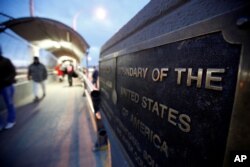A growing number of Americans are having their passports taken away and their citizenship called into question by immigration authorities.
The Washington Post reported that some Latinos born in U.S. cities along the Texas-Mexico border are being denied American passports, held in immigration detention centers and placed into deportation proceedings.
Others have been blocked from entering the United States.
According to the Post, those having passports taken away or their applications rejected have something in common: They were largely born near the Texas-Mexico border and are Hispanic descendants.
The U.S. government alleges that from the 1950s through the 1990s, midwives and physicians working along the border issued American birth certificates to babies born in Mexico, which some birth attendants have admitted to in court.
The State Department told the paper that it denies adjusting its “policy or practice regarding the adjudication of passport applications.” But it said the border region “happens to be an area of the country where there has been a significant incidence of citizenship fraud.”
Immigration lawyers, along with cases identified by the Post, suggest there has been a “dramatic” change in passport issuance and the enforcement of immigration laws.
Scrutiny of those born in border towns is nothing new, the paper reported. It started under the George W. Bush administration and continued for some time into the Obama administration. But passport denials ended around 2009 after a settlement with the American Civil Liberties Union (ACLU).
Yet, denials have started again and are increasing under the Trump administration, immigration attorneys told the paper.
The Post covered the story of Juan, who was born in Brownsville, Texas. He was a private in the Army, a cadet in the Border Patrol, and is currently a state prison guard. The State Department requested “evidence of his mother’s prenatal care, his baptismal certificate, (or) rental agreements from when he was a baby.”
Though Juan provided some of the documentation, he was still denied a passport.
The ACLU released a statement saying though it challenged passport denials a decade ago, which forced a government settlement, denials appear to be surging under the current administration.
“The Trump administration’s attempt to deny passports to long-term American residents living in border areas is just one more inhumane act in a series of unlawful actions. We’re investigating and exploring possible legal steps,” Lee Gelernt, deputy director of the ACLU’s Immigrants’ Rights Project, said in a statement.
Andre Segura, legal director of the ACLU of Texas, said for South Texans, a passport is a necessary part of life.
“These communities work, shop, seek medical care and have families on both sides of the border. The ACLU challenged this practice a decade ago to ensure that arbitrary and discriminatory passport denials would stop. We cannot let such a blatant attack on the civil rights of Americans stand,” he wrote.
Some of the U.S. citizens affected by situations like this decided to sue the government. The Post reported that those who sued usually won their cases.





